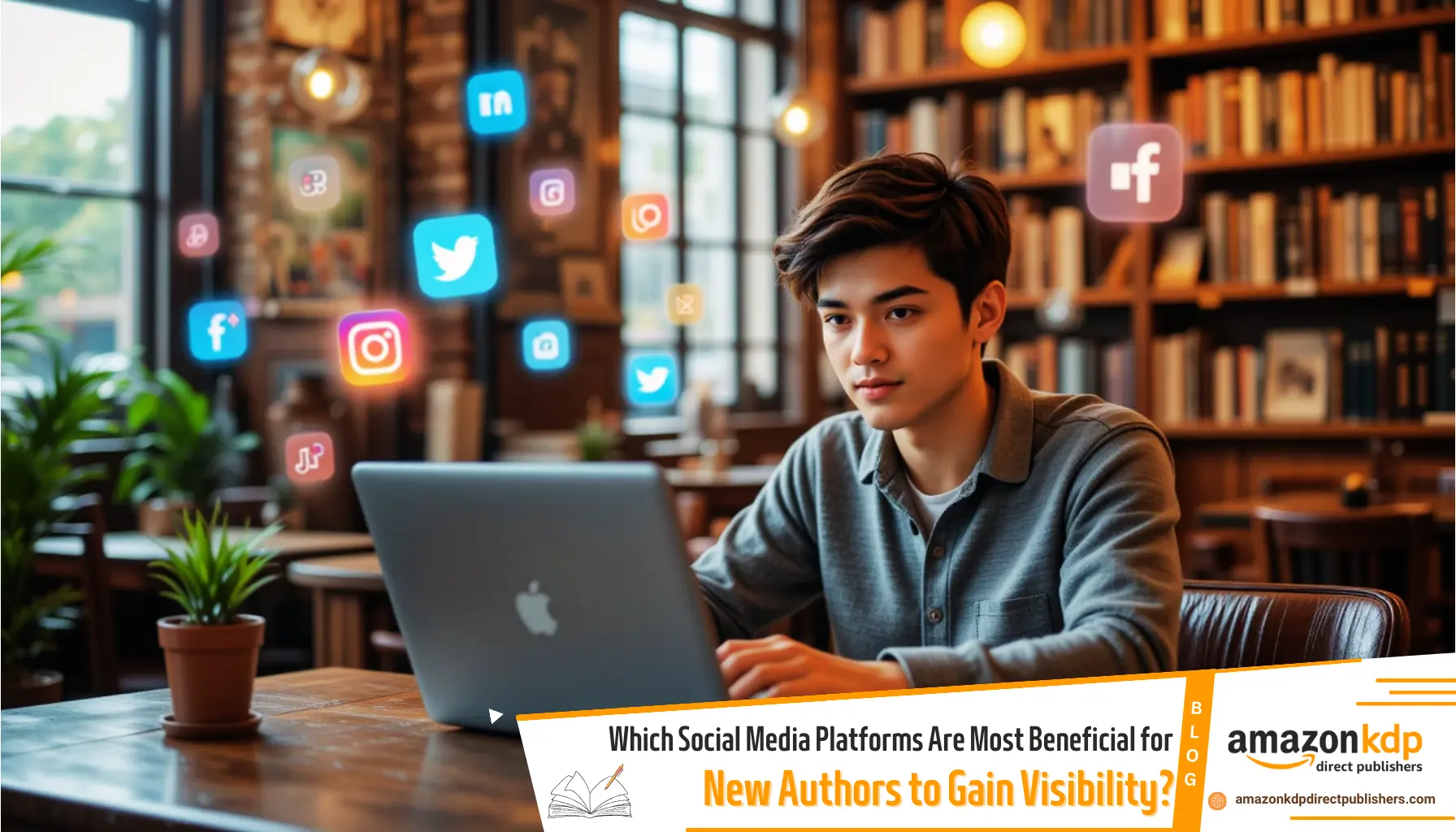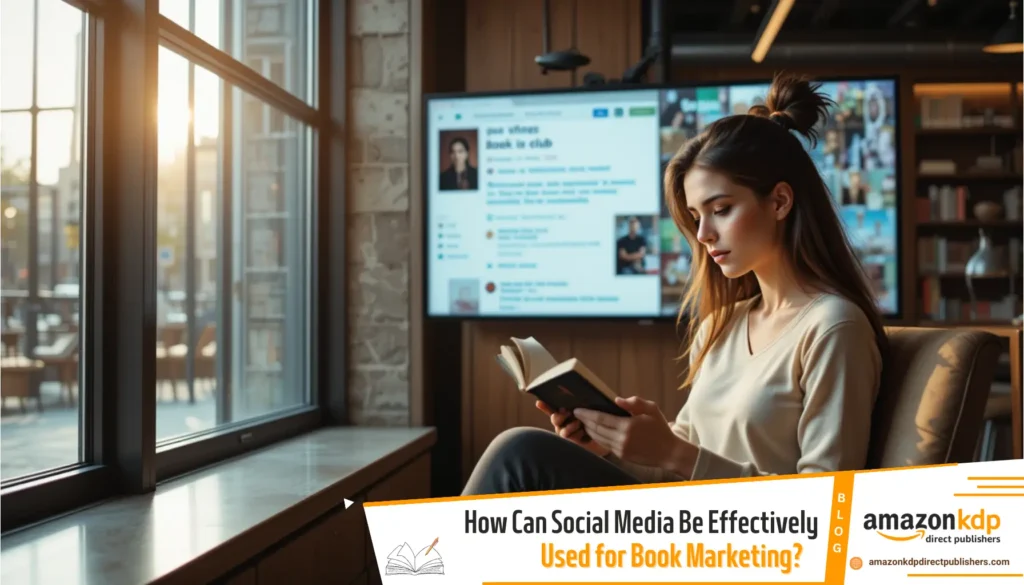Navigating Social Media: A New Authors to Gain Visibility Guide
For new authors to gain visibility, navigating the vast landscape of social media can be overwhelming—but it’s also one of the most powerful tools in your marketing arsenal. Whether you’re self-published or traditionally published, building a strong online presence can help you attract readers, establish authority, and ultimately sell more books. But not all platforms are created equal. In this guide, we’ll break down the best social media platforms for authors, based on how well they support discoverability, engagement, and community building.
1. Goodreads: Where Readers Live and Breathe Books
When it comes to niche targeting, Goodreads is a goldmine. It’s built entirely around reading, reviewing, and discovering books—which makes it a natural starting point for any new author looking to gain traction. Think of it as a social network dedicated to your exact audience: readers.
Why Goodreads Works for New Authors
- Author Program: You can claim your author profile, link your books, add a bio, blog posts, and engage with fans.
- Giveaways: Run book giveaways to generate reviews and buzz before or after launch.
- Book Lists & Groups: Participate in reader groups and add your books to curated lists for greater exposure.
- Reviews & Ratings: Social proof matters. The more visibility and reviews your book gets here, the more likely readers are to pick it up.
Goodreads may not be flashy, but it’s purposeful. It’s not about trends—it’s about your target audience. If you’re looking for long-term visibility among dedicated readers, this is your first stop.
2. Facebook: All-in-One Platform for Versatile Outreach
Facebook remains a heavy hitter in the social media game. Its broad demographic base and multifaceted features make it ideal for both content diversity and community-building. For new authors to gain visibility, Facebook offers flexibility and scope.
How Facebook Supports Author Visibility
- Author Pages: A professional-looking page allows you to post updates, teasers, launch news, and more.
- Groups & Communities: Join or create genre-specific groups. Interacting in these spaces can help you network and subtly promote your work.
- Live Videos: Host live Q&A sessions, book readings, or behind-the-scenes discussions.
- Advertising: Facebook Ads can be highly targeted by age, interests, reading habits, and more.
One of Facebook’s biggest advantages is its ability to host different content types: images, links, polls, live streams, and events. This versatility allows you to reach readers at various points in the buyer’s journey—from discovery to purchase.
3. Instagram: A Visual Playground for Authors
In today’s book marketing world, Instagram—especially with its booming #Bookstagram community—is an essential tool. If you’re a new author trying to gain visibility, Instagram helps you show off your book in beautiful, bite-sized pieces.
What Makes Instagram Effective for Authors
- Visual Branding: Your feed is your brand. Share beautiful book covers, reading nooks, fan art, and mood boards.
- Stories & Reels: Share daily updates, short videos, or behind-the-scenes peeks.
- Hashtags: Use tags like #BookLaunch, #IndieAuthor, #AmReading, and #Bookstagram to reach readers organically.
- Engagement: Run giveaways, ask questions, and interact via DMs or comments.
Instagram appeals to the aesthetic-driven book lovers—those who want to feel a connection. It’s an excellent place to build relationships with influencers, showcase your writing journey, and create content that people want to share.
4. X (Formerly Twitter): Real-Time Engagement for Writers
Despite its ever-evolving nature, X (formerly Twitter) still offers real-time engagement and networking benefits that can’t be ignored. For authors who are witty, insightful, or just have a lot to say in a short space, X is the place to be.
X as a Visibility Tool for Authors
- Microblogging: Share quotes, writing updates, blog links, or participate in writing challenges like #NaNoWriMo.
- Hashtag Power: Use trending tags like #AmWriting, #WritersLife, or #IndieAuthor to gain traction.
- Networking: Follow other authors, editors, publishers, and readers to stay in the loop.
- Threads: Use threads to tell stories, share insights, or give sneak peeks into your book.
The best part? Tweets can go viral fast, and the barrier to entry is low. You can engage daily without creating elaborate content. For introverted or busy authors, that’s a big win.
5. TikTok: The Viral Machine for Book Promotion
TikTok isn’t just for dance challenges anymore—it’s revolutionizing book marketing. The rise of #BookTok has helped many debut authors skyrocket to fame with short, creative videos. For new authors to gain visibility, this platform can be a game-changer.
How TikTok Helps Authors Stand Out
- Short-Form Video: Create 15-60 second clips to share book trailers, writing tips, day-in-the-life content, or reader reactions.
- Trends & Sounds: Jump on trending sounds or video styles to gain traction quickly.
- Authenticity: Readers on TikTok love real, unpolished content. It’s more about passion than perfection.
- BookTok Community: An engaged and enthusiastic niche that can turn your book viral overnight.
TikTok’s algorithm favors discoverability, meaning you don’t need a huge following to get your video in front of thousands. For authors with personality and creativity, the platform offers enormous growth potential.
6. YouTube: Deep Dives and Personal Connections
While YouTube may not be the first platform that comes to mind for authors, it’s one of the most powerful when used correctly. For new authors to gain visibility, YouTube allows for longer-form content that helps deepen reader connections and build authority.
Why YouTube Works for Author Branding
- Author Vlogs: Share your writing journey, inspirations, and behind-the-scenes content to connect with readers on a personal level.
- Book Trailers: Tease your upcoming release with cinematic previews.
- Interviews & Live Sessions: Collaborate with other authors or host Q&A events to engage your audience.
- Educational Content: Share writing tips, book reviews, or discussions on publishing.
Video content gives authors the chance to express tone, emotion, and energy—something text-based platforms can’t always capture. This platform is especially useful for authors writing in genres that benefit from rich storytelling or those offering educational and non-fiction material.
7. LinkedIn: A Hidden Gem for Non-Fiction and Professional Authors
LinkedIn might seem like an odd choice, but if you’re writing non-fiction, business, or self-help books, this platform can be incredibly strategic. For new authors looking to gain visibility within professional circles or establish themselves as thought leaders, LinkedIn is a goldmine.
What Makes LinkedIn Valuable for Authors
- Professional Authority: Publishing articles and thought pieces on LinkedIn boosts your credibility in your niche.
- Networking: Connect with industry professionals, influencers, editors, and corporate decision-makers.
- Engaged Audience: LinkedIn users are often seeking personal and professional development, making them prime readers for non-fiction books.
- Speaking Opportunities: Visibility on LinkedIn can lead to podcast invitations, guest posts, or speaking gigs.
If your book ties into career growth, entrepreneurship, productivity, or leadership, then LinkedIn could deliver highly targeted exposure and open doors to new opportunities.
8. Pinterest: Visual Search Engine with Evergreen Content
Often overlooked, Pinterest is more of a visual search engine than a social platform, and it’s perfect for evergreen content. If your book appeals to niche audiences—think fantasy readers, romance lovers, or DIY enthusiasts—Pinterest can drive long-term traffic.
How Pinterest Benefits New Authors
- Pin Book Covers: Create eye-catching pins with your cover and link them to your sales or landing page.
- Share Quotes & Excerpts: Beautiful quote graphics are highly shareable and often saved for inspiration.
- Blog Promotion: If you run a blog or author website, Pinterest can bring consistent referral traffic over time.
- Mood Boards: Share the aesthetic of your book via themed boards—great for engaging visual learners.
Pinterest pins continue to circulate for months, even years, unlike posts on most platforms that disappear in hours. If you’re looking to build a passive discovery channel, Pinterest deserves a place in your toolkit.
9. Threads: Instagram’s Conversation-Focused Sibling
Meta’s new platform, Threads, is designed for short-form discussions and real-time interaction, much like the original X (Twitter). For new authors trying to gain visibility in a fresh, less-saturated space, Threads offers a great head start.
How Threads Can Help Authors Engage
- Short Conversations: Share thoughts, snippets of writing, and interact with readers in a casual way.
- Early Adoption Advantage: Since it’s still growing, visibility is higher for new accounts.
- Integrated with Instagram: Easy cross-posting and access to your existing Instagram audience.
- Topic Exploration: Engage in niche conversations around genres, writing tips, or publishing.
While still evolving, Threads has potential to become a casual, author-friendly zone. If you already have an Instagram following, Threads is a no-brainer addition to your marketing efforts.
10. Substack: Building a Loyal Reader Base via Email
While not a traditional social media platform, Substack plays a crucial role in helping new authors gain visibility by nurturing deeper reader relationships through newsletters.
Why Substack Works for Author Marketing
- Direct Communication: Send updates, exclusive content, and book previews directly to your subscribers’ inboxes.
- Monetization: Offer paid subscriptions for premium content like serialized novels, writing tips, or behind-the-scenes insights.
- Minimal Noise: Your message isn’t buried under an algorithm or competing posts—readers signed up because they want to hear from you.
- Community Building: Build trust and loyalty, which translates into stronger book launches and consistent support.
Substack helps authors reclaim control from the algorithms. Whether you’re sharing your journey, serialized fiction, or thought leadership, newsletters offer a direct pipeline to your most loyal readers.
11. Discord: Private Community with High Engagement
Discord is a community-building powerhouse. Originally popular among gamers, it’s now being embraced by authors and creators who want a deeper connection with their audience. For new authors to gain visibility and build a strong inner circle of readers, Discord offers unmatched interaction.
How Discord Supports Author Communities
- Real-Time Chat: Create topic-based channels like #book-launches, #fan-art, or #writing-updates to organize discussions.
- Reader Clubs: Host virtual book clubs and discussions directly with your audience.
- Exclusive Access: Share first looks, writing tips, or early drafts with loyal fans.
- Events & Q&As: Schedule live chats, contests, and virtual meetups.
Discord fosters a sense of exclusivity and belonging. Your biggest fans become part of your journey—not just spectators. For authors writing series or building universes, it’s a way to deepen engagement and boost loyalty.
12. Reddit: Dive into Niche Communities
Reddit might not be a traditional marketing channel, but it’s full of passionate, topic-specific communities. For new authors to gain visibility, Reddit offers authentic spaces to share insights, engage in meaningful discussions, and subtly promote your work—if done respectfully.
Reddit’s Unique Appeal for Authors
- Subreddits Galore: Engage with genre-specific communities like r/Fantasy, r/Books, r/WritingPrompts, or r/IndieAuthors.
- AMA Sessions: Host an “Ask Me Anything” to introduce yourself and talk about your writing process.
- Writing Feedback: Get critiques and share excerpts in writing-focused threads.
- Reader Interaction: Find out what your audience really thinks—and wants—straight from the source.
However, Reddit users despise spammy promotion. Always prioritize value over selling. When you earn trust here, your voice becomes a respected one—and that visibility can snowball.
13. Tumblr: A Comeback Platform for Fandom and Fiction
Tumblr might not be in the spotlight like it used to be, but it’s quietly resurging—especially among fandoms and younger readers. For fantasy, romance, sci-fi, or fanfiction-friendly books, Tumblr is a hidden gem for new authors to gain visibility in passionate reader communities.
Why Tumblr Still Works for Authors
- Fandom Culture: Engage with communities who love lore, aesthetics, and headcanons.
- Creative Posting: Share snippets, writing diaries, book quotes, or fictional character blogs.
- Reblogging Power: Posts have extended lifespans through reblogs and sharing.
- Customization: Your Tumblr blog can double as a mini-website or mood board for your book.
If your writing taps into nostalgia, deep lore, or character-driven plots, Tumblr’s aesthetic and emotionally-charged vibe can align perfectly with your brand.
14. Mastodon: Decentralized and Community-Driven

As more people seek alternatives to big platforms, Mastodon is carving a niche. It’s a decentralized social network, similar to Twitter but spread across independent servers. For authors, it’s an emerging space that values genuine interaction over algorithms.
How Mastodon Benefits Indie Authors
- Niche Servers (Instances): Choose a server focused on writing, books, or art to target your ideal audience.
- No Algorithms: What you post gets seen organically—no need to chase trends or gaming the system.
- Community Focused: Smaller, more intimate groups where you can form real bonds.
- Authenticity Wins: Be yourself. Authenticity and consistency go further than flashy promos.
While it might not replace the reach of bigger platforms, Mastodon is ideal for authors who want to grow meaningful relationships and support without noise or ads.
15. Final Thoughts: Create Your Own Social Media Mix
There’s no one-size-fits-all answer for new authors to gain visibility through social media. The key is finding platforms that align with your content style, personality, and audience preferences.
Here’s a Quick Breakdown:
| Platform | Best For | Content Style |
| Goodreads | Book discovery & reviews | Book profiles, giveaways |
| Broad reach & groups | Mixed content & live sessions | |
| Visual branding | Reels, Stories, images | |
| X / Twitter | Real-time updates | Short texts, threads |
| TikTok | Viral growth | Short-form videos |
| YouTube | Deep engagement | Vlogs, trailers, interviews |
| Non-fiction authors | Thought leadership, professional posts | |
| Evergreen content | Visuals, pins linking to blogs | |
| Threads | Early engagement | Snippets, discussion threads |
| Substack | Email loyalty | Newsletters, exclusive updates |
| Discord | Community building | Chat, events, beta reads |
| Authentic interaction | Long-form discussions, AMAs | |
| Tumblr | Aesthetic engagement | Creative writing, fan content |
| Mastodon | Decentralized community | Organic sharing, niche focus |
Ultimately, the platforms you choose should reflect your writing goals and target readers. Start small, test and learn, and focus on consistent, authentic engagement. Your ideal readers are out there—you just need to meet them where they are.
FAQs
1. What’s the best social media platform for new authors to start with?
Start with Goodreads or Instagram. Goodreads connects directly with readers, while Instagram has a vibrant book-loving community that thrives on visuals.
2. How often should new authors post on social media?
Consistency beats frequency. Aim for 2–4 posts per week per platform. Quality and engagement matter more than daily posting.
3. Can social media really help sell books?
Yes, especially when you use it to build relationships. Social media boosts visibility, creates community, and drives interest in your books organically.
4. Is it necessary to be on all platforms?
Nope. Focus on 2–3 that align with your strengths and audience. It’s better to do a few well than to spread yourself too thin.
5. How can introverted authors succeed on social media?
Leverage platforms like Substack, Reddit, or Pinterest where you can engage thoughtfully without constant interaction. Find your rhythm and stay authentic.






